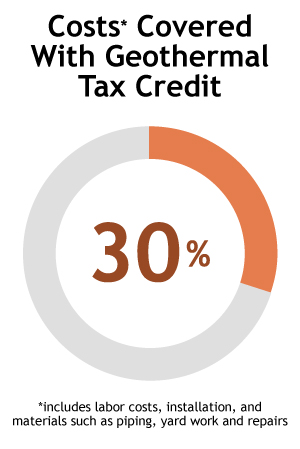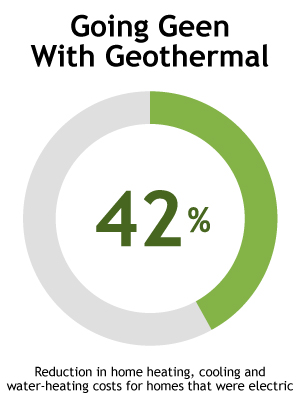
How would you like to save money on your heating and cooling bills no matter how hot your summer is or how much snow you’ll get this winter?
Geothermal heating and cooling systems are among the most energy-efficient systems available for your home and they can provide a wide range of health, safety, and cost benefits for you and your family.
By tapping into the Earth and using what’s available to us naturally, without combustion or propane, you’ll be introducing a safe new way for your family to stay comfortable. Best of all, installing this new system will get you a big fat tax credit and usually pays for itself within five years. That means in year six, you’ll start pulling in savings to be used for other things.
Geothermal pumps are a home investment that the sooner you install, the sooner your investment actually starts paying you!
Now, let’s get into the specifics of your savings and improvements:
1. Tax Credits for Geothermal Systems

Installing a geothermal heat pump can be a great advantage thanks to an available Residential Energy-Efficient Property Credit of up to 30 percent off the installation cost.
The tax credit covers 30 percent of the labor costs, installation, materials such as piping, yard work, and repairs. The one thing that is not covered in the distribution system and emergency heat system for your installation. Your qualified geothermal heat pump partner will be able to explain what this means to your savings and provide you with a proper receipt and understanding. This will be essential to getting your tax credit.
The tax credit has two very specific requirements that must be met in order to receive your benefit:
“Uses the ground or groundwater as a thermal energy source to heat the dwelling unit or as a thermal energy sink to cool the dwelling unit,” and
“Meets the requirements of the Energy Star program which are in effect at the time the equipment is installed.”
The Geothermal Genius service has also collected a list of specific savings that may apply based on the state in which you live. For example, Pennsylvania offers a wide range of rebate services for people who invest in geothermal heating and cooling solutions.
Loan programs can cover between $1,000 and $35,000 with an interest rate under 9 percent on a term of between 3 and 20 years. So how much does geothermal energy cost? When doing your calculations, don’t forget to account for the financing that can help you out.
Depending on where you live, you may be eligible for a utility rebate program. The current programs active in Pennsylvania include:
- Allegheny Power – Residential Energy-Efficiency Rebate Program
- Duquesne Light Company – Residential Energy-Efficiency Program
- Met Edison – Residential Energy-Efficiency Programs
- PECO Energy – Residential Energy-Efficiency Rebate Program
- PECO Energy – Heating-Efficiency Rebate Program
- Penelec – Residential Energy-Efficiency Programs
- Penn Power – Residential Energy-Efficiency Programs
- PPL Electric Utilities – Residential Energy-Efficiency Rebate Program
Heat pump installation can result in major savings for you and your home.
Schedule a Geothermal Evaluation
2. The Durability of Geothermal Heat Pump Systems
Another great thing about geothermal systems is that they’ve got a lot less wear and tear compared to your typical home heater or air conditioner.
Installation inside your home and under the ground means that your system isn’t going to be impacted by the regular issues that typical home systems face. Your geothermal heat pump won’t get clogged with falling leaves or get choked up from rain, ice, sleet, or snow. Extreme temperatures typically won’t reach your below-ground system, so you won’t face as much seasonal wear or temperature variance.
Kids will be kids, and that can mean jamming sticks or other items into a typical home unit. Your below-ground system is a very unlikely target for vandalism. These systems also have fewer moving parts compared to other systems, so there’s less to be damaged or replaced.
Geothermal heat pump efficiency makes systems a great investment because avoiding these issues means reduced maintenance, which saves you time and money. Don’t forget the warranties that come with your underground pipes. Thanks to a 25-year warranty on most underground pipes, geothermal heat pump systems typically last 20 years before you’re in need of any major maintenance.
3. Geothermal Systems are Environmentally Friendly and Cost Effective.

If you’re big on going green and saving the planet, a geothermal heat pump just may be your new best friend.
These geothermal heating and cooling systems use between 25 and 50 percent less electricity than your standard cooling and heating systems. Thanks to its subterranean heat source, you’re not using electricity to generate heat and then using more to move that heat around. That means great savings in terms of the use and cost of geothermal energy.
Some reports have found that geothermal heat pumps can reduce as much as 42 percent of home heating, cooling, and water-heating costs for homes that were all electric.
Part of this reduced cost comes from the savings in heating your water – some systems can even essentially provide free hot water. Geothermal heating and cooling builds with a desuperheater, which can be used to send extra heat from the pump and its compressor to a hot-water tank. This heat generates enough energy to knock out your hot-water cost in the summer and greatly reduce it during those cold winter months.
According to the EPA, geothermal heat pumps can reduce energy consumption by up to 44 percent compared to air-source heat pumps and up to 72 percent compared to electric heating in your standard AC setup.
The Energy Department notes that more than 66 percent of all electrical energy and 40 percent of natural gas consumption is used to heat our homes and other buildings. Roughly 40 percent of the total energy consumption your home will use this year will specifically be used to heat or cool rooms.
These systems lack a combustion component, so your reliance on conservatory gasses is also an improvement to the environment. The Conserve-Energy-Future group estimates that each year you use a geothermal unit will reduce annual emissions equal to what is cleaned by 750 trees.

4. Geothermal Systems Run Quietly
One of the worst things about that old clunker of a heat pump you’ve got is all the noise it makes inside and outside of your home.
Geothermal heat pumps are installed underground, so you and your neighbors can enjoy the peace and quiet of your outdoor patios without annoying noises. Geothermal systems are made to be quiet in your home as well.
Your guests will ask you, how does a geothermal heat pump work? It’s so quiet they’ll never hear it running.
5. Geothermal Pumps as a Home Investment
Geothermal heat pumps work in any home. These heat pumps can be installed in new homes and can also be developed for retrofitted homes. You may end up with some additional space since geothermal systems typically require less space than other HVAC systems.
Geothermal heating and cooling platforms can also remove many of the vents and other items built into walls and ceilings through the smart placement of the heat pump and its other equipment.
Your home will also get a lift on its curb appeal because you’ll lose the need to hide the outside box and other equipment. Even during a retrofit, the geothermal system will help you avoid a lot of external equipment.
This reduction helps you take better care of your roof and not have to hide anything with other features. Since all of the aboveground pieces of your geothermal heat pump are located indoors, you’ll have a better-looking yard and avoid that annoying fan sound.
6. Selective Heating Zones Save Money
With current systems heating your entire home, you may wonder, how does a geothermal heat pump work for sections you don’t want to use?
Geothermal heat pump efficiency means you can heat your home in a wide variety of ways, and one of the more popular setups is the zone heating and cooling system.
Using zones allows you to heat or cool different areas of your home at different times. This means you don’t have to heat rooms you aren’t using, such as the kids’ rooms when they go off to college, or you can heat different rooms to different temperatures all at the same time.
If you have a central room in your home that houses your computers or other machines, your geothermal heat pump system can quickly move out of that high-temperature zone. If you’re also heating a room at the same time, the system can move your computer room’s hot air to that heat zone for a more efficient operation.
7. The Zero Cost of Geothermal Energy
How much does geothermal energy cost? Potentially nothing.
Your geothermal heating and cooling option will likely pay for itself in just a few years, and after that, all of the savings turn into profit for your home. Let’s look at a great way for homes in Pennsylvania to save money. This example looks at a home that uses both propane and fossil fuels for its heating and cooling and shows some great benefits when it comes to the cost of geothermal energy.
If you assume an average installation cost of roughly $25,000 and the 30 percent federal tax credit – removing $7,500 from your cost – then the total cost of your installation is roughly $17,500.
For the propane usage in the home, assuming roughly 1,500 gallons of propane each winter and a cost of $3 per gallon, your total cost is $4,500 in propane each year. However, going to a geothermal system will help you reduce or completely remove this cost. That means an annual savings of $4,500.
You will increase your electric energy use when you switch away from propane, but you’ll see a much less expensive replacement. The average home will increase its electricity use by 4,000 kWh to 5,000 kWh annually. At around 15 cents per kWh, that’s an added cost of $600 to $750.
Looking at these numbers, you’ll see that:
- The total cost in your first year will be $17,500.
- Changing your electricity and propane usage ends up netting you savings of at least $3,750.
- In four years and eight months, you’ll break even. Let’s assume that the remaining $1,250 is put back into the maintenance of your system.
- Starting in year five, you’ll likely start earning money through these savings. Every year, your bills will be $3,750 less than with your old system.
- Over 15 years, you’ll save $38,750 with this system.
Another important note for our calculations is that it doesn’t take into account the fuel increases that we seem to see each winter. This means that your savings will actually likely be much larger because fuel costs for propane and other fossil fuels rise around 4.5 percent each year while electricity only rises by 2 percent each year.
With electricity’s price and its projected rise both lower than propane, you’re seeing immediate savings today, and those will grow significantly over the life of your system.
8. Heat Pump Installation No Matter the Home
Homes across the U.S. are diversifying as we move to city centers, out into the country away from the noise, and everywhere in between. The great news is that geothermal heat pump installation can happen just about anywhere you go.
Because you’re not installing a lot of equipment outdoors, you don’t even need much of a yard to get a pump installed. You’ll need the land rights and space for specific installation, but this is minimal.
You also don’t need a lot of new space because these systems can fit inside many existing HVAC system spaces – it’s often even a smaller installation space. The housing of all the parts inside your home also means that you can access it for maintenance easily, so you don’t need an attic space or something else to set up all this equipment.
9. Energy Savings All Year Round
Another important feature of these geothermal heat systems is that they make use of ductwork in your home. This can help you control both the humidity and temperature levels throughout the year.
Based on geothermal heat pump efficiency, you can also use the platform to heat your floors or even cool down those areas that bake in the sun each day.
The ability to maintain humidity in your home works both ways, so your system will also act as a dehumidifier when you’re ever in need of a little less in the air.
10. Indoor Air Quality Health and Safety
The Department of Energy says that geothermal heat pumps are safer and cleaner for a variety of reasons.
The DOE says you’re living in a safer home thanks to a geothermal system because it involves “no combustion, no flues, and no odors; just safe, reliable operation year after year.”
Many consumers also find geothermal to be more comfortable than a traditional HVAC system because it can deliver a constant flow of air and maintain a consistent level of humidity by using a two-speed fan system.
If you use well water on your property, the DOE also notes that the geothermal system, when properly installed, has little to no danger of polluting the groundwater on your property. The fluids that these systems use are environmentally friendly and water-based, so even the antifreeze will not cause harm.
Invest in a Geothermal System Today
Now that you know the benefits that these geothermal heating and cooling systems can provide, it’s up to you to take action.
For Pennsylvania residents from Mount Joy to Lancaster, you’ll be hard-pressed to find a better partner than RSC Heating & Air Conditioning. Our pumps can reduce your electricity usage by as much as 50 percent and we know your specific area.
Start on your journey to saving thousands of dollars by learning more about RSC Heating and Air Conditioning’s geothermal options today.




